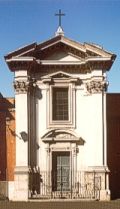|

|
COLLECTION
IN FAVOUR OF THE VICTIMS
OF THE EARTHQUAKE IN SALVADOR
|
07/03/2001
Report by
Giovanni Impagliazzo
|

|
San Salvador 7/3/2001
The first emergency measures of the Community of Sant'Egidio.
The camp of Caf´┐Żtalon, the Esquelita for the children,
the situation in the rural areas. The old people.
These last days we were able to visit many parts of the country together with the Community of Sant'Egidio of San Salvador. The situation appears serious and at the same time reveals the social contradictions of the country.
In the capital life has returned to normal: the offices are open, this week the schools have started again, the streets are open to traffic, the shops offer all sorts of goods.
But when you approach the outlying district of Santa Tecla you enter into another world. It was at Santa Tecla that the earthquake was most violent: a whole densely inhabited hill was evacuated after a landslide had destroyed more than 1,000 houses, killing around 450 people.
A big camp, "El Cafetalon", was set up near the hill to house the victims of Santa Tecla and the villages of the area. Today it is said that about 10,000 people are living in the camp but nobody knows for certain how many people have found shelter there as every day new families arrive and others leave in search of somewhere more hospitable.
Water and food are lacking in the camp and there is no infrastructure to make life more civilized. The homeless receive at most a bag of dried beans which they have to cook on an improvised stove next to the tent with the risk of causing a fire.
The tents which are set up very close to one another, are small and very low. Thousands of children run about together with chickens, dogs, geese and other farmyard animals that the people have brought with them.
The camp is exposed to the heat of the sun and is permanently covered in dust. Many of the children have begun to show signs of dermatitis and eye infections caused by exposure to sun and dust and lack of hygiene due to the scarcity of water.
After visiting "El Cafetalon" the Community had the idea of starting a project tho help the children. That is why, a month ago, the Esquelita was founded. It is a school which is open four afternoons a week and is attended by around 140 children of different ages.

The classes are held at the edge of the camp under a clump of trees. There is one sector, or rather a tree for children under 6 and other trees shelter the rest, divided into classes. In the midst of all the confusion of the camp these children really want to learn and to study. Even if the surroundings are not ideal and they have to write with the book on their knees, they express a strong desire to learn and to study.
Many of them come from small villages or houses scattered over the hills where coffee is grown and which surround the capital. Most of them have never been to school. Their first experience has been in the hardship of the camp. And for them it is a real party, also because every afternoon ends with songs and a substantial snack.It is an attraction for the adults too. Many of the childrens' parents approach us during school and ask us shyly to continue to give lessons to their children even when they leave the camp so that they can learn to read and write. Soon there will be a big tent to receive more children.
 I also visited many villages in the western part of the country, devastated by the earthquake of 13 January. Here the situation is very serious. Many villages have been partially destroyed. The greatest damage has been suffered by the poorest people who usually choose to build there houses on a slope, or uneven grounds, so as not to take up the little land on which crops can be grown. The earthquake here has caused landslides and the houses have been buried together with the people's few possessions. In the diocese of Sonsonate almost all the churches of the Colonial period have also suffered considerable damage: the cathedral itself which dates from 1700 is completely destroyed. I also visited many villages in the western part of the country, devastated by the earthquake of 13 January. Here the situation is very serious. Many villages have been partially destroyed. The greatest damage has been suffered by the poorest people who usually choose to build there houses on a slope, or uneven grounds, so as not to take up the little land on which crops can be grown. The earthquake here has caused landslides and the houses have been buried together with the people's few possessions. In the diocese of Sonsonate almost all the churches of the Colonial period have also suffered considerable damage: the cathedral itself which dates from 1700 is completely destroyed.
In this diocese the Community of Sant'Egidio has distributed the first emergency supplies: a sign of hope in a particularly inaccessible zone, dificult to reach both for state assistance and for international solidarity.
|
![]()
